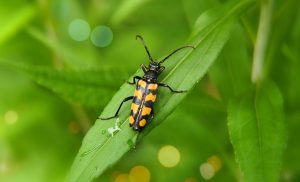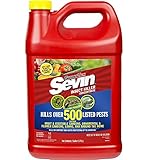Cucumber beetles are a major pest for gardeners growing cucumbers, melons, and squash. These beetles can cause significant damage to plants by feeding on leaves, stems, and fruit.  Additionally, cucumber beetles are vectors for diseases like bacterial wilt, making them a serious threat to crops. To protect your cucumber plants, it’s essential to choose the right insecticide.
Additionally, cucumber beetles are vectors for diseases like bacterial wilt, making them a serious threat to crops. To protect your cucumber plants, it’s essential to choose the right insecticide.
In this article, we will explore the best insecticides for cucumber beetles, including both chemical and organic options. We will also provide tips for selecting the right product based on your gardening preferences.
7 Best Insecticides for Cucumber Beetles
1. Sevin Insect Killer
Sevin Insect Killer is one of the most effective chemical insecticides for controlling cucumber beetles. It contains carbaryl, a powerful chemical that attacks the nervous system of pests. This insecticide is known for its fast-acting results, providing immediate relief from beetles.
Sevin is easy to apply and comes in various forms, such as dust, spray, and granules. However, it is not suitable for organic gardeners due to its chemical nature. You will need to reapply it after rain to ensure long-lasting protection.
It provides excellent control over cucumber beetles and other garden pests. Sevin has been proven effective even for large infestations, offering strong protection for cucumbers. Nevertheless, careful handling is necessary as the chemical can also affect beneficial insects.
2. Pyganic Organic Insecticide
Pyganic Organic Insecticide is a natural solution that uses pyrethrins, extracted from chrysanthemums. This organic option effectively controls cucumber beetles by targeting their nervous system. Pyganic works quickly and is suitable for use on a wide range of plants, including edible crops.
One of the advantages of Pyganic is that it’s safe for organic gardening. It doesn’t leave harmful residues, making it an excellent choice for those who prioritize sustainability. However, frequent applications may be necessary for ongoing control of beetle populations.
While it is effective against cucumber beetles, it may not provide as long-lasting protection as chemical insecticides. Reapplication is essential, especially after rain. Pyganic’s impact is quick, but it may need to be reapplied more often to maintain control over cucumber beetles.
3. Neem Oil Insect Control
Neem Oil is another natural, organic insecticide that works by disrupting the feeding behavior and reproductive cycles of cucumber beetles. Derived from the seeds of the neem tree, it acts as both an insect repellent and a pesticide. Neem oil is effective in controlling a wide variety of pests, including cucumber beetles.
This insecticide is safe for humans, pets, and beneficial insects when used as directed. It doesn’t harm the environment and is biodegradable, making it an eco-friendly choice. However, it may require more frequent applications compared to synthetic alternatives.
Neem oil is most effective when applied early in the season, preventing infestations from spreading. While it’s effective against cucumber beetles, its control over heavy infestations may be limited. It’s a great choice for organic gardeners who are looking for an environmentally safe solution.
4. Bonide Systemic Insect Control
Bonide Systemic Insect Control is a chemical insecticide that works by being absorbed into the plant’s system. This makes it effective against cucumber beetles that feed on the plant tissues. Bonide is designed for use on a variety of vegetables, including cucumbers, and offers long-lasting control.
By being systemic, it provides continuous protection for up to 4 weeks, reducing the frequency of applications. It’s especially useful for severe infestations and offers effective control even for hard-to-reach areas. However, it may not be suitable for organic gardeners.
Bonide’s long-lasting effect makes it ideal for gardeners who want to control cucumber beetles with minimal effort. It’s also effective against a broad range of pests, including aphids and mites. But, it is important to follow the application instructions carefully to avoid harming beneficial insects.
5. Safer Brand Diatomaceous Earth
Safer Brand Diatomaceous Earth is a physical insecticide made from the fossilized remains of diatoms. It works by damaging the exoskeletons of cucumber beetles, causing them to dry out and die. This option is non-toxic to humans and animals, making it a safe choice for organic gardeners.
Diatomaceous earth is effective when dry and can be applied to the soil and plants to protect against cucumber beetles. It is also a good option for controlling other garden pests like ants and aphids. However, it’s less effective in wet conditions, as moisture reduces its effectiveness.
This natural insecticide requires reapplication after rain or watering to maintain its effectiveness. While it’s safe for humans and pets, it can harm beneficial insects, so it’s important to apply it selectively. Diatomaceous earth is best used in combination with other control methods for a well-rounded pest management strategy.
6. Monterey Garden Insect Spray
Monterey Garden Insect Spray contains spinosad, a naturally occurring substance that targets cucumber beetles and other garden pests. Spinosad works by disrupting the insect’s nervous system, leading to paralysis and death. This organic insecticide is safe for use on vegetables and flowers, making it a versatile option for garden pests.
The main advantage of Monterey Garden Insect Spray is that it is safe for beneficial insects, including bees, when applied properly. It offers broad-spectrum protection and works well against both adult beetles and larvae. However, it’s essential to apply it early before infestations become severe.
Monterey is highly effective and provides long-lasting control. It’s an excellent choice for organic gardeners who need an environmentally friendly solution. However, it’s crucial to avoid overuse, as excessive applications may harm non-target organisms.
7. Garden Safe Brand Insect Killer
Garden Safe Brand Insect Killer is made from plant-derived ingredients and is designed to control pests without harming plants. It is effective against cucumber beetles, aphids, and other common garden pests. This insecticide is safe for edible plants and can be used on cucumbers, squash, and other vegetables.
Garden Safe is easy to apply and is safe for beneficial insects when used according to the label. It’s a great option for gardeners looking for a natural solution. However, like many organic options, it may require frequent reapplications to keep cucumber beetles under control.
This insecticide is suitable for gardeners who want to avoid harsh chemicals. It is most effective when applied early in the pest’s lifecycle, before large infestations occur. While it’s effective, it might not be as fast-acting as synthetic insecticides.
Tips for Choosing the Best Insecticide for Cucumber Beetles
- Consider the Type of Gardening: Choose a product that fits your gardening style—whether organic or conventional. Organic gardeners should opt for natural solutions like neem oil or diatomaceous earth.
- Effectiveness: Make sure the insecticide you choose is effective against cucumber beetles. Some products may offer quicker results, while others provide longer-lasting protection.
- Safety for Plants: Ensure the insecticide will not harm your cucumber plants or other edible crops. Always follow the recommended application instructions.
- Environmental Impact: Consider the environmental impact of the insecticide. Organic options tend to have a lower environmental impact compared to chemical ones.
- Ease of Application: Choose an insecticide that is easy to apply, whether in spray, dust, or liquid form, based on your gardening needs.
- Repeat Applications: Some insecticides need to be reapplied regularly, especially after rain or irrigation. Choose a product that fits your schedule.
Conclusion
Cucumber beetles can cause significant damage to your crops, but with the right insecticide, you can protect your plants and ensure a successful harvest.
Organic options like neem oil and diatomaceous earth are great for eco-conscious gardeners, while chemical options like Sevin and Bonide Systemic Insect Control offer powerful, long-lasting protection.
Choose the insecticide that best suits your needs and gardening style to keep cucumber beetles at bay.
Always read and follow the label instructions for safe and effective use. By selecting the right insecticide, you can ensure your cucumber plants remain healthy and free from pests, leading to a bountiful harvest.
Recent Posts
When choosing the Best Fertilizer for Heather, it’s essential to consider various factors that influence the health and blooming of these unique Heather plants as they require a balanced nutrient...
Choosing the best fertilizer for heliconia ensures that the plant receives the proper nutrients, promoting healthy growth and stunning blooms. Heliconia plants are known for their vibrant flowers...






